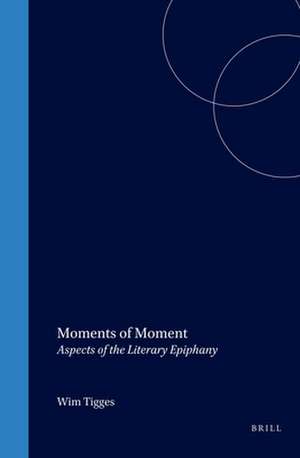Moments of Moment: Aspects of the Literary Epiphany: DQR Studies in Literature, cartea 25
Wim Tiggesen Limba Engleză Hardback – 31 dec 1998
Din seria DQR Studies in Literature
- 18%
 Preț: 526.39 lei
Preț: 526.39 lei -
 Preț: 254.70 lei
Preț: 254.70 lei - 18%
 Preț: 518.99 lei
Preț: 518.99 lei - 23%
 Preț: 502.56 lei
Preț: 502.56 lei - 15%
 Preț: 503.40 lei
Preț: 503.40 lei -
 Preț: 189.88 lei
Preț: 189.88 lei - 15%
 Preț: 441.65 lei
Preț: 441.65 lei - 15%
 Preț: 482.09 lei
Preț: 482.09 lei - 15%
 Preț: 440.61 lei
Preț: 440.61 lei - 18%
 Preț: 776.73 lei
Preț: 776.73 lei - 18%
 Preț: 1640.79 lei
Preț: 1640.79 lei - 18%
 Preț: 584.25 lei
Preț: 584.25 lei - 15%
 Preț: 497.33 lei
Preț: 497.33 lei - 18%
 Preț: 561.59 lei
Preț: 561.59 lei - 21%
 Preț: 371.67 lei
Preț: 371.67 lei - 18%
 Preț: 636.10 lei
Preț: 636.10 lei - 18%
 Preț: 585.70 lei
Preț: 585.70 lei - 18%
 Preț: 748.76 lei
Preț: 748.76 lei
Preț: 837.14 lei
Preț vechi: 1020.90 lei
-18% Nou
Puncte Express: 1256
Preț estimativ în valută:
160.19€ • 171.30$ • 133.56£
160.19€ • 171.30$ • 133.56£
Carte indisponibilă temporar
Doresc să fiu notificat când acest titlu va fi disponibil:
Se trimite...
Preluare comenzi: 021 569.72.76
Specificații
ISBN-13: 9789042006362
ISBN-10: 9042006366
Dimensiuni: 155 x 230 mm
Greutate: 1 kg
Editura: Brill
Colecția Brill
Seria DQR Studies in Literature
ISBN-10: 9042006366
Dimensiuni: 155 x 230 mm
Greutate: 1 kg
Editura: Brill
Colecția Brill
Seria DQR Studies in Literature
Cuprins
Wim TIGGES: The Significance of Trivial Things: Towards a Typology of Literary Epiphanies. Robert LANGBAUM: The Epiphanic Mode in Wordsworth and Modern Literature. C.C. BARFOOT: Milton Silent Came Down My Path: The Epiphany of Blake's Left Foot. Thomas DUTOIT: Epiphanic Reading in Ann Radcliffe's The Mysteries of Udolpho. Valeria TINKLER-VILLANI: I Saw, I Felt, But I Cannot Describe: Demonic Epiphany in Gothic Fiction. Alison CHAPMAN: Uncanny Epiphanies in the Nineteenth-Century Sonnet Tradition. Gene BLUESTEIN: The Emerson-Whitman Tradition and Transcendental Materialism. Paul DEVINE: Leitmotif and Epiphany: George Moore's Evelyn Innes and The Lake. Philipp WOLF: The Lightning Flash: Visionary Epiphanies, Suddenness and History in the Later Work of W.B. Yeats. Christine van BOHEEMEN-SAAF: Epiphany and Postcolonial Affect. Nigel PARKE: Stifled Cries and Whispering Shoes: Rites of Passage in the Modern Epiphany. Peter LIEBREGTS: A Little Light ... to Lead Back to Splendour: Ezra Pound and Epiphany. Suzette HENKE: Virginia Woolf's To the Lighthouse: (En)Gendering Epiphany. Carmen CONCILIO: Things that do Speak in Elizabeth Bowen's The Last September. Caroline BLINDER: Between the Unimagined and the Imagined: Photographic Aesthetics and Literary Illumination in Walker Evans and James Agee's Let Us Now Praise Famous Men. Grazia CERULLI: Theatres of Trope: White Epiphanies in Wallace Stevens and Samuel Beckett. Sjef HOUPPERMANS: Proust and Beckett: Visions of Mourning. Martin BIDNEY: Failed Verticals, Fatal Horizontals, Unreachable Circles of Light: Philip Larkin's Epiphanies. Jay LOSEY: Demonic Epiphanies: The Denial of Death in Larkin and Heaney. Garrett STEWART: Kubrick's Odyssey as Filmic Epiphany. Celia WALLHEAD: Eros and Thanatos in the Epiphany in D.M. Thomas's The White Hotel. Dermot KELLY: Joycean Epiphany in Seamus Deane's Reading in the Dark. Rachel FALCONER: Telescoping Timescapes: Short Fiction and the Contemporary Sense of Time. Ashton NICHOLS: Cognitive and Pragmatic Linguistic Moments: Literary Epiphany in Thomas Pynchon and Seamus Heaney. Notes on Contributors. Index.
